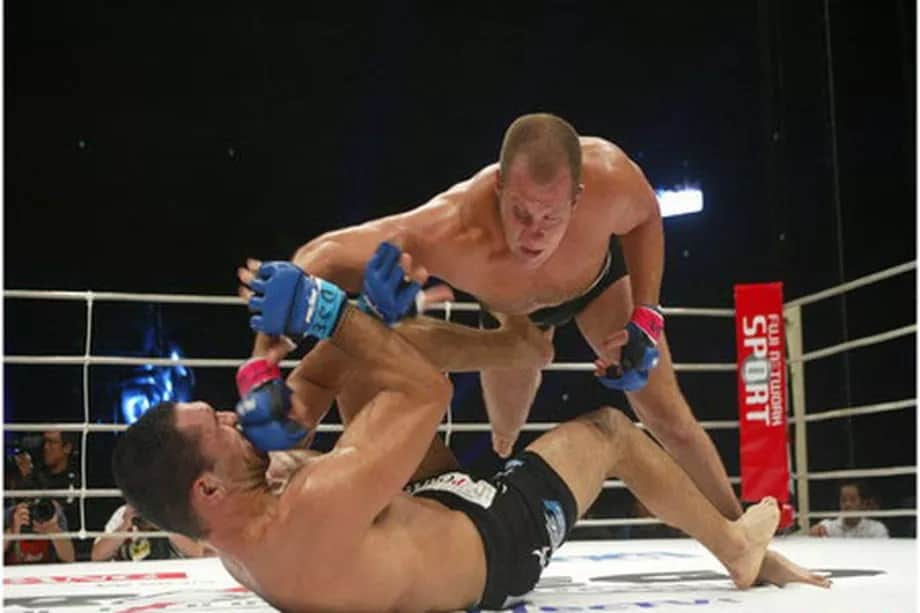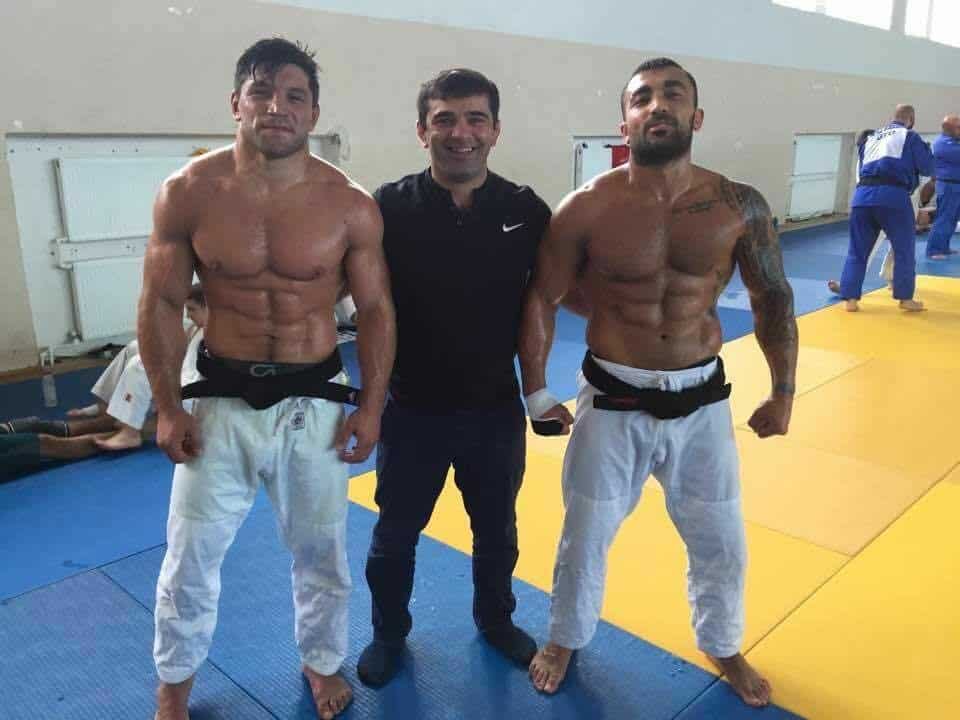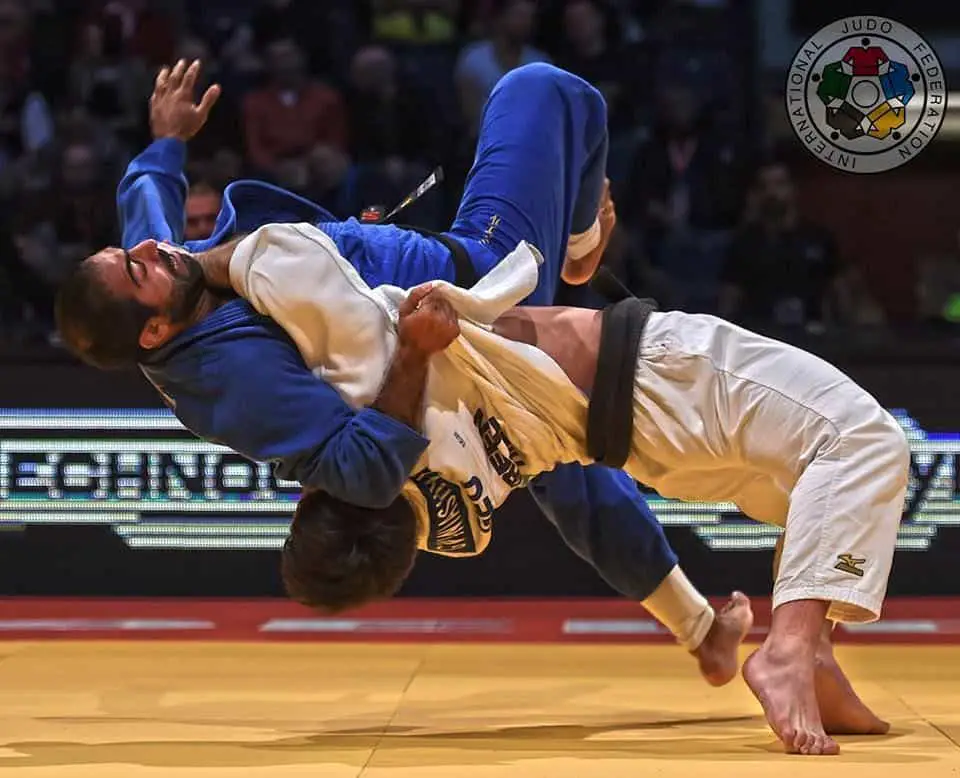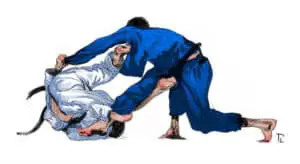There is a lot of hype about BJJ. Many believe BJJ is the most complete and effective grappling martial art. However we will explore how BJJ stacks up against Judo and see if the older brother (Judo) can defeat the younger brother (BJJ).

Can Judo beat BJJ? Yes, Judo can beat BJJ. Fedor Emelianenko a high level Judoka famously defeated world class BJJ black belt Antônio Nogueira in MMA in 2003 and 2004. Sanae Kikuta, a national high school Judo champion from Japan won the 88kg class of the premier No-Gi grappling tournament, ADCC in 2001 defeating famous BJJ black belt Saulo Ribeiro in the final.
Judo and BJJ are both grappling martial arts, Judo focuses primarily on the standing position while BJJ focuses mainly on ground fighting. However BJJ athletes can be well versed in the standing position and Judokas can be exceptional submission hunters. Therefore you will find Judokas who have no problem defeating BJJ athletes.
A Judo black belt should be at least at a blue belt level in BJJ with many high level black belts being at a purple, brown or black belt level. Travis Stevens an Olympic Judo silver medalist at Ri0 was awarded his black belt by John Danaher a notoriously difficult coach to acquire grade from after training BJJ for just 1 year. This shows the submission skill of many elite Judokas.
In sport athletes who specialize their training based around specific rule sets tend to dominate those rule sets. In Judo although ground fighting exists and Judokas need to have some ground fighting skills it is a limited aspect of the sport. This puts Judokas at a disadvantage when they compete in BJJ competitions particularly when BJJ athletes are able to pull guard and force Judokas to engage on the ground. A specialized BJJ athlete will be a significant favorite over a Judoka in a pure BJJ match.
In a pure Judo match for the same reasons mentioned above a Judoka will be a heavy favorite over a BJJ athlete. As BJJ athletes do not spend nearly the same amount time in the standing position resulting in their takedowns being inferior to Judoka’s takedowns.

In an MMA fight both Judo and BJJ can defeat each other. The variable of striking which is added to the mix makes the result of a MMA fight between Judo and BJJ athletes harder to predict. You see many more BJJ athletes in MMA than Judokas as BJJ up until recently has not had a viable professional career path. This creates a skewed sample as you are only seeing a small percentage of Judokas compete in MMA and often not the best examples. Can you imagine how well Teddy Riner or Shohei Ono would do in MMA. However, 3 Judokas who did have great success in MMA include Fedor Emelianenko, Ronda Rousey and Karo Parisyan.
Which Is Easier To Learn Judo Or BJJ?
Which is easier to learn judo or BJJ? BJJ is easier to learn than Judo as a beginner as the techniques can be done slowly and be modified to help beginners. BJJ beginners also don’t have worry about falling incorrectly and injuring themselves as most of the training takes place on the ground.
Judo throws need to be performed quickly as they rely on momentum and often have a lot of steps which can be difficult for a beginner to grasp. If a Judo throw is performed too slowly often the whole throw will fail.
BJJ doesn’t suffer from this problem. Nearly all BJJ techniques can be slowed down which makes it much easier for a beginner to perform. For example you can perform an armbar from guard at a snail’s pace and the technique will still work.
A big part of Judo is falling correctly. If you fall incorrectly you can suffer severe injuries. In Judo training you will be taking hundreds of falls per session so you need to know how to fall without hurting yourself. This skill is known as breakfalling. It can be difficult for a beginner to learn how to do this effectively as it is quite scary letting someone throw you through the air where your feet go over your head. You can’t even think about sparring in Judo until your breakfalling is at a respectable level which can take a couple of months.
As most BJJ technique takes place on the ground breakfalling is not nearly as important in BJJ as it is in Judo. It is not uncommon to find senior BJJ belts who are not proficient in breakfalling. In BJJ a beginner spar on their first day as they can start sparring on the ground and therefore don’t have to worry about being thrown on their head.
Why Is Judo Cheaper Than BJJ?

Why is Judo cheaper than BJJ? Judo is cheaper than BJJ as Judo often receives government funding as it is an Olympic sport and the coaches are often unpaid volunteers. BJJ does not usually receive funding and many BJJ coaches derive a full income from teaching and running their BJJ academies.
Most Judo coaches are not professionals they have other sources of income and teach the art for the love of Judo. Judo clubs will often receive some government funding but often this is just to keep the lights on and rent the space.
BJJ on the other hand is often run for profit. Most BJJ academies do not receive any government funding. However this only partially explains the cost of BJJ. The major reason why BJJ is so expensive is because BJJ academies are run as profit maximizing businesses where the coaches and employees are making full time incomes. These incomes can only be supported with high monthly fees.
The reason BJJ is so profit driven is because the Gracie’s came to America with the specific goal of popularizing BJJ so they could profit from the sport. They wanted to use America’s wealth to enrich themselves by charging a high price which could be supported by the American market. After other BJJ black belts saw the success the Gracie’s were having in America they left Brazil with the same goal of making themselves wealthy through opening BJJ schools.
Does Judo Help You Lose Weight?

Does Judo help you lose weight? Yes, Judo does help you lose weight. Judo is intense exercise and you can expect to lose between 500-800 calories per hour of Judo. With a normal Judo session lasting 2 hours you will burn well over 1000 calories every time you train. Judo will make it easy to establish a calorie deficit and lose weight.
The key to losing weight is creating a calorie deficit. There are two ways to create a calorie deficit either eat less or burn more calories. Judo is a powerful anaerobic workout which results in your burning a lot of calories. This helps you achieve a calorie deficit making you lose weight in no time. If you want to supercharge your weight loss combine Judo with a healthy diet and the extra weight will disappear in a flash.
Is Judo More Effective Than BJJ?
Is Judo more effective than BJJ? Judo is more effective than BJJ in stand up fighting. BJJ is more effective than Judo in ground fighting. Judo’s training split is 70% standing, 30% ground while BJJ is the opposite. As fights start standing Judo is more effective in a fight however once the fight ends up on the ground BJJ will be more effective.
Is Judo Good For BJJ?
Here is Claudio Calasans using Judo in BJJ Highlights
Is Judo good for BJJ? Yes, Judo is good for BJJ. Judo will help you improve your takedowns allowing you to ragdoll BJJ athletes in the standing position. Judo will also increase your ability to transition from takedowns to submissions quickly which will increase your submission rate. Judo will also increase your grip strength and explosiveness.
Judo will turn you into an expert at takedowns and throws. This is an area where many BJJ athletes are weak. By being strong in the standing position this will allow you to takedown your opponents helping you score points and land in dominant positions (mount, side control) which will make working for the submission finish much easier.
As Judo athletes have limited time to hunt for submissions they have developed an explosive way to attack submissions off transitions from throws. This a skill which is undeveloped in BJJ as in BJJ takedowns and submissions are taught distinctly and their is a lack of fluidity between the two areas. By training Judo you will learn how to quickly and explosively transition from throw to submission which will help you catch BJJ athletes off guard leading to you getting more submissions.
Judo athletes are known for their strength and explosiveness. By training Judo you will improve your physical capability. You can never be too strong or fast in BJJ. This increased physicality will only help you dominate and impose your will on your opponent.
Is Judo Or BJJ Better For Self Defense?
Here is a compilation of Judo being used for self defense
Is Judo or BJJ better for self defense? Judo is better than BJJ for self defense. All fights start standing and Judo is much better than BJJ in the standing position. A single Judo throw where an attacker lands on their head can end a fight. Judo also teaches submissions so if the fight does go to the ground a Judoka will have no problem applying a submission.
Many BJJ athletes are not technically sound in the standing position. If they never train takedowns in training how can they be expected to take down someone in a highly intense self defense situation. If the majority of BJJ techniques happen on the ground how can a BJJ athlete utilize their technique if they can’t safely and quickly take the fight to the ground. This is a major flaw in BJJ.
Judokas are experts at taking people down. As all self defense fights start standing a Judoka will be able to effortlessly throw his attacker to the ground. A Judoka can modify his throws so he purposefully throws an attacker on their head which can result in the attacker being knocked unconscious or seriously injured. Judokas are also well versed in submissions so if they do decide to follow their attacker to the ground they will be able to quickly apply a choke or joint lock and quickly end the fight.
How Often Should You Train Judo?

How often should you train Judo? You should train Judo at least 3 times a week. 3 times a week will allow your body to recover and you to be excited for next training session. It is also frequent enough where you will remember techniques and your body will be able to encode Judo movements into your muscle memory.
How often you train Judo depends on your goals. If you are just starting out I recommend you go three times a week. So you feel fresh for every session but you aren’t taking such long breaks between sessions that your body is forgetting the movements. If your body is reacting well to training 3 times a week and you want to increase your volume feel free to. You just need to make sure you are recovering properly otherwise you increase your risk of injury.
If you have goals of being a champion competitor than you are going to need to train at least 6 times a week. You will also probably need to include some days where you train twice a day and also add some strength and conditioning sessions on top of your regular Judo training.
Conclusion
Athletes dominate competitions they specifically train for. A Judoka will be a heavy favorite against a BJJ athlete in a Judo competition and vice versa. In MMA there have been examples of Judokas defeating BJJ athletes and BJJ athletes defeating Judokas. It is hard to predict who will win between a Judoka and BJJ athlete in an MMA fight as the added variable changes the dynamics of the fight significantly. However Judo is more than capable of beating BJJ and we have seen many examples of this throughout history. Both Judo and BJJ are highly effective martial arts which can be used in self defense scenarios and in MMA.
